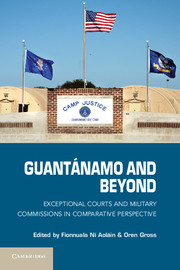Book contents
- Frontmatter
- Contents
- Contributors
- Acknowledgments
- Introduction: Guantánamo and Beyond
- Part I Military Commissions and Exceptional Courts in the United States
- Part II Exceptional Courts and Military Commissions Elsewhere
- 9 The Law Working Itself Pure? The Canadian Experience with Exceptional Courts and Guantánamo
- 10 Vicious and Virtuous Cycles in Prosecuting Terrorism
- 11 Terrorism Prosecution in the United Kingdom
- 12 Trying Terrorists
- 13 Exceptional or Not? An Examination of India's Special Courts in the National Security Context
- Part III International Law, Exceptional Courts, and Military Commissions
- Index
- References
11 - Terrorism Prosecution in the United Kingdom
Lessons in the Manipulation of Criminalization and Due Process
Published online by Cambridge University Press: 05 June 2014
- Frontmatter
- Contents
- Contributors
- Acknowledgments
- Introduction: Guantánamo and Beyond
- Part I Military Commissions and Exceptional Courts in the United States
- Part II Exceptional Courts and Military Commissions Elsewhere
- 9 The Law Working Itself Pure? The Canadian Experience with Exceptional Courts and Guantánamo
- 10 Vicious and Virtuous Cycles in Prosecuting Terrorism
- 11 Terrorism Prosecution in the United Kingdom
- 12 Trying Terrorists
- 13 Exceptional or Not? An Examination of India's Special Courts in the National Security Context
- Part III International Law, Exceptional Courts, and Military Commissions
- Index
- References
Summary
CONSISTENT WITH HIS “WAR ON TERROR” PARADIGM, President George W. Bush asserted that “it is not enough to serve our enemies with legal papers.” Resonant with this view, although also reflecting its own rich legal history of counterterrorism, the United Kingdom's primary legal focus in the immediate aftermath of 9/11 was weighted more toward executive interventions than court-based criminal prosecution. The immediate emanation of “executive intervention” was the detention without trial of foreign terror suspects, a measure characteristic of executive intervention in that it was on the basis of the evaluation of future risk by a government minister rather than exhaustive proof of a past crime before a court. However, this vying between executive action and criminal prosecution never pitched as decisively in favor of executive action as in the United States and is now fading in United Kingdom domestic law. The first part of this chapter will examine the foundations for the reinvigoration of the criminal justice paradigm. This aspect advances this book's inquiry into exceptional courts, as it posits the alternative approach that regular models of criminal justice can and should predominate in counterterrorism. Next, this chapter will explore the salient implications to date for British criminal justice, particularly questioning the extent to which the delivery of criminal justice has remained “regular” or whether elements of exceptionality have insinuated themselves within the process. The final part of this chapter will reflect on the future implications, followed by wider reflections.
- Type
- Chapter
- Information
- Guantánamo and BeyondExceptional Courts and Military Commissions in Comparative Perspective, pp. 245 - 266Publisher: Cambridge University PressPrint publication year: 2013
References
- 2
- Cited by



